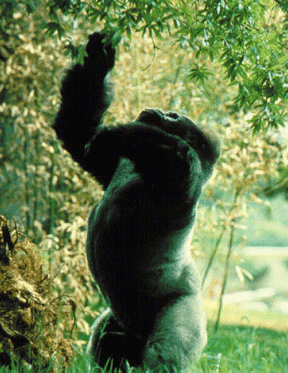1984–1999: Turnaround
From Worse to World Class

outdoors, Willie B. explored
his new home in The
Ford African Rain Forest.
In 1984, a series of highly publicized events revealed deteriorating conditions at the Zoo, prompting Parade magazine to label the institution as one of the top 10 worst in the nation. A subsequent investigation lost the Zoo its accreditation, and an outraged public demanded that the facility be closed. Mayor Andrew Young assembled an emergency crisis team, appointing Terry L. Maple, PhD, as interim director. The team set out to address immediate issues, beginning with reducing the collection in order to provide more appropriate living spaces for the animals.
New governance followed in 1985, with the Zoo’s privatization and the creation of the nonprofit “Atlanta Fulton County Zoo, Inc.” The first governing board convened that same year, and the rebounding institution emerged with a fresh new name – Zoo Atlanta. Thanks to a stellar capital campaign and an ambitious renovation plan, the Zoo was in redevelopment mode by 1986. A number of high-profile projects, including Flamingo Plaza and the Wildlife Theater, were completed in the 1980s. Notably, The Ford African Rain Forest opened in 1988, giving the now 30-year-old Willie B. his first foray outdoors since infancy. The Ford complex also created lush habitats for a collection of gorillas loaned by Emory University’s Yerkes National Primate Research Center. Willie B.’s social life captured the public eye, and Atlantans were thrilled when the former bachelor’s first offspring, Kudzoo, was born in 1994. The silverback would sire four more offspring – Olympia, Sukari, Willie B., Jr., and Lulu – over the next five years.
Several new additions opened in 1989, the Zoo’s centennial year: Masai Mara, featuring a recreation of the African savanna; Mzima Springs, with elephants foraging near an authentic watering hole; and new naturalistic habitats for black rhinos, drills and Sumatran tigers. The Zoo that had once disgraced the city was now a point of pride, receiving awards at the local, state and national levels.
Next: Pandas to Present